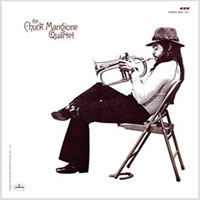The Chuck Mangione Quartet Mercury/Speakers Corner SRM 1 631
Unknown to many at the time, Mangione had already established himself as a respected mainstream bop trumpeter ten years earlier on albums recorded for Jazzland and Riverside (alongside his keyboardist brother, Gap) under the moniker The Jazz Brothers. The Chuck Mangione Quartet, along with one other Mercury release, Alive, presents Mangione just before his music took a turn toward more pop-oriented leanings. It captures a vibe that existed in the early '70s that is missed today, suggested in the cover photo of a long-haired, bearded Mangione, casually dressed in bell-bottoms, long-sleeve t-shirt and ever-present fedora. He's slouched in his chair, one leg crossed over the other, exuding a sense of relaxation, mellowness and chic. The era saw a transition from hippie culture to yuppie culture -- from Jefferson Airplane and the Grateful dead to Windham Hill and ABBA, the introduction of the Sony Walkman, the launch of Don Cornelius's Soul Train and the overwhelming popularity of disco fueled by the music of the Bee Gees and Donna Summer. Unfortunately, Mangione, basking in the celebrity accompanying his success, rarely returned to his former musical style. The music on . . .Quartet falls squarely in the genre of straight-ahead jazz, but its overall character approaches easy listening. It's as smooth as silk. There is not a harsh moment on the entire album, and the solos are tastefully executed with nary a false note. The lead off, "Land of Make Believe," is a bouncy Latin-tinged number with a catchy melody and nice soloing by Gerry Niewood on soprano sax and Mangione on his burnished-sounding flugelhorn. The lovely, lengthy "Self Portrait" features Niewood on understated flute on top of a bed of Latin percussion with Mangione paying a brief homage to Miles Davis in his solo and Ron Davis contributing some fine conga playing. Trumpeter Freddie Hubbard’s modal composition "Little Sunflower" finds Mangione once again channeling Miles Davis before he gets lost in aimless noodling. Niewood, revealing he has listened to a lot of John Coltrane, fares better with a striking solo atop some tasteful, electric piano courtesy of Mangione. Niewood’s composition "Floating" finds the composer doing just that on his soprano sax in this lazy, lyrical number featuring fine solos all around. Niewood is especially effective on one of the album's highlights, Luis Bonfa’s popular "Manha De Carnival," where his playing swoops in and around the melody in the tropical mood established by Mangione’s electric piano. Mangione catches fire when the tempo doubles during his solo and lays down some solid horn playing. Drummer Ron Davis and the late bass player Joel De Bartolo provide the music’s rhythmic drive and solid foundation. Speakers Corner has done vinyl fans and mainstream-jazz lovers a big favor by releasing this LP. It has been out of print for decades and, to my knowledge, has never been reissued on CD. This release is another of Speakers Corner's fine-sounding records. It was cut at Sterling Sound in New York from the original analog master tapes and pressed at Pallas in Germany. It is perfectly flat and heavy, and the dead-quiet surfaces let all of the nuances in the music through. The jacket is a faithful reproduction of the original, even to the inclusion of a reminder in the liner notes that the album is available on "Musicassettes and Stereo 8 tapes" (!). Those indeed were the days! |

